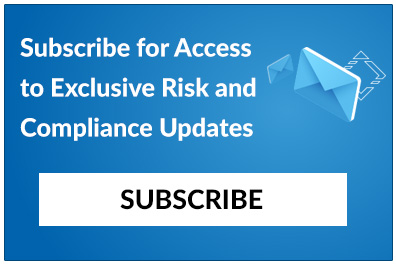Home/ Blog / Regulatory Compliance Challenges
Regulatory compliance is a dynamic domain that responds to the regulatory environment and antficipates the organization’s future needs. The challenges faced by compliance managers across the industry thus keep evolving based on regulatory pressure, emerging trends, and market risks. Here are ten regulatory compliance challenges being faced by compliance teams across the industry:

1 – Inefficient Task Management
Financial organizations often struggle to ensure that regulatory compliance and regulatory change related tasks are completed on time throughout the organization. There is no visibility of these tasks for them because they are often being undertaken by other departments. This lack of visibility results in a lack of transparency which can result in unexpected delays.
The task management solution built into modern compliance management solution simplifies task management throughout the organization with automated workflows and notifications.
2 – Increased Documentation Requirements
Regulatory bodies want better documentation and audit trails. Regulators focus on using data to understand the system and its weaknesses better and expect businesses to have better documentation standards in their compliance management frameworks. This documentation needs to be available for regulatory exams, external audits, and more.
Modern compliance management solutions alleviate this issue by automating a lot of the documentation.
3 – Issue Resolution Inefficiency
The compliance management team can detect non-compliance and provide the corrective measures required to fix the non-compliance. The problem is that there is often a delay in issue resolution because the task may not be given a high enough priority in the other departments. Compliance teams need an easy way to track all open and closed issues.
A compliance management platform enables all stakeholders to quickly collaborate throughout the enterprise, resulting in faster issue mitigation.
4 – Executive Visibility
The board of directors and other executive members of the organization rely on reporting from the regulatory compliance team. They have no other way to monitor or assess the performance of the current regulatory compliance framework or any of the activities within the framework.
The dashboards built into compliance management systems provide executive members of the organization a real-time view of all compliance activities and important compliance metrics throughout the organization.
5 – Regulatory Exams
Regulatory examination take a considerable amount of resources and often do not go smoothly for the organization. A lot of effort has to be put in to organize everything and prepare for the regulatory exams. A lack of coordination between the different departments further exacerbates the chaos and results in stress for all the employees involved.
Compliance management platforms provide a separate regulatory exam workflow that streamlines the process throughout the enterprise, resulting in a smooth experience for all the stakeholders involved.
Compliance and risk management departments around the country recognize the critical nature of using the appropriate regulatory compliance technologies. Share on X6 – Lack of Training
Recent regulatory reforms have highlighted the enterprise-wide knowledge gap on regulatory compliance. Regulatory compliance is only possible if the whole business knows and adopts regulatory compliance standards into its process. Businesses have recognized that, although it is critical to enhance their monitoring capability for detecting compliance concerns, the other side of the equation is also critical.
Learning management systems within compliance platforms ensure that all employees have the required compliance training based on their job roles.
7 – Lack of Alignment
Compliance with regulatory requirements is possible if the entire organization is committed to ensuring compliance. Each business unit inside the firm has its objectives that align with the overall goals of the corporation. Compliance might appear to be an impediment for other departments, as while compliance is a need for all departments, it is not the primary aim or target for departments other than risk and compliance.
Compliance management platforms make it easier for all stakeholders to understand how they contribute to the compliance framework. Being able to see the big picture highlights the importance of compliance activities, thus increasing alignment between the different departments and the regulatory compliance team.
8 – Budgeting Concerns
Compliance and risk management departments around the country recognize the critical nature of using the appropriate regulatory compliance technologies. The issue is that they frequently struggle to communicate this relevance to other organizational stakeholders. Instability is not a good time to invest, which may make it more difficult for risk and compliance teams to obtain budget clearance for technological initiatives.
9 – Accounting Concerns
Budgeting for regulatory compliance is also a source of contention, and organizations may wish to better how they distribute the expense of regulatory compliance across the firm. It is unjust to consider regulatory compliance expenditures in isolation from the budgets of all other departments; each department within the firm must adhere to regulatory requirements. Therefore, it is fair to budget compliance accordingly.
10 – COVID Whiplash
The government adopted many regulatory adjustments in order to ease the regulatory load on businesses. The global turmoil is finally coming to an end, and things are returning to normal. This will need organizations to refocus their efforts on stability – something they have not done in over two years.
Interested in seeing how your organization can overcome such challenges and improve its regulatory compliance management framework? Get in touch with our compliance management experts for a demo of the American Bankers Association endorsed Predict360 Compliance Management platform.
Request a Demo
Complete the form below and our business team will be in touch to schedule a product demo.
By clicking ‘SUBMIT’ you agree to our Privacy Policy.



